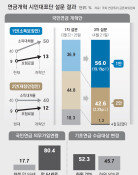Hyundai Motor must learn lessons from GMs massive recalls
Hyundai Motor must learn lessons from GMs massive recalls
Posted May. 22, 2014 06:27,
General Motors said on Tuesday (U.S. local time) that it is recalling 2.4 million sedans and crossover vehicles that have defective transmission cables and airbags. The U.S. automaker has recalled 13.6 million vehicles this year alone. This is equivalent to 87.3 percent of the 15.58 million vehicles that were sold in the U.S. last year.
GM also holds the record of being a single automaker that has recalled the largest number of vehicles in the U.S. in a year. The company recalled 10.75 million vehicles in 2004. The firm already broke this record even before the end of the first half this year. It has to immediately spend 400 million U.S. dollars to cover the cost for the latest recalls in the second quarter.
GM is proactively staging the recall campaign because its concealing of a defect in the ignition switch for over 10 years was revealed in mid-February this year. The U.S. National Highway Traffic Safety Administration levied 35 million dollars in fines to GM in connection with the incident.
GM is apparently pushing for a strategy to recover consumer credibility early on by making proactive recalls. However, the volume of vehicles on recalls has snowballed exponentially, which causes a concern to the automaker. Customers have now started to doubt the quality of GM vehicles as well as the credibility of its management. GM`s recall crisis deals a fatal blow to GM, which only recently began to see signs of rebound after suffering a freefall in sales that began following the global financial crisis in 2008.
Toyota is also still reeling from the aftermath of massive recalls in 2010. The Japanese automaker has regained No. 1 post in global sales, but this achievement was made due to its aggressive advance into emerging markets by banking on the weakening yen. The situation is different in advanced countries where quality is considered a priority. Even in the U.S., Toyota was controlling 14.0 percent of the market this year (January April), which is about 3 percentage points lower than its market share in 2009 (17.0 percent), prior to its recall binge. This illustrates that once credibility is tarnished, it is very difficult to recover.
These developments send some important implications to Hyundai Motor Group including Hyundai Motor and Kia Motors, which have grown to become the worlds fifth largest automaker. While the markets standard on quality has become far stricter, quality management is becoming increasingly difficult as the number of its suppliers has increased. Hyundai Motor Group Chairman Chung Mong-koo has stressed that quality is the most fundamental. GM and Toyota should also have known this. It is one thing to know but is quite another to take actions.







